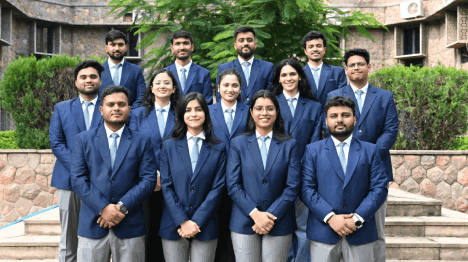- About Us
-
Academics
Schools
Programs
General Information
-
Faculty
The faculty members and researchers working at IIHMR University come from varied backgrounds including, but not limited to medicine, public health, management, economics, statistics, demography, human geography, social and behavioral sciences, rural development and pharmaceuticals.
-
Admissions
- Research
Publications & Journal
- Executive Education
Executive Programmes
- Online Certification Courses
ONLINE CERTIFICATION Courses
- Training
- Placements
- Contact
- Pradanya
- Blog
- Fee Payment
- NAAC
- IQAC
- NIRF
-
About Us
- About IIHMR University
- Board of Management
- Academic Council
- Board of Studies
- Research Board
- Institutional Review Board
- Finance & Audit Committee
- Departmental Research Committee
- Chairperson's Message
- President's Message
- IIHMR University Act
- Infrastructure
- Collaboration
- Ranking
- Board of Studies (School of Digital Health)
- Awards & Accolades
-
Academics
- Institute of Health Management Research
- School of Pharmaceutical Management
- ML Mehta School of Development Studies
- School of Digital Health
- SD Gupta School of Public Health
- MBA (Hospital and Health Management)
- MBA (Pharmaceutical Management)
- MBA (Development Management)
- MBA (Healthcare Analytics)
- Master of Public Health
- Student Manual – Cohort 9 (2021-2023)
- Master of Public Health (Offered by Johns Hopkins Bloomberg School of Public Health, USA in cooperation with IIHMR University, Jaipur, India)
- Ph. D.
- MBA CSR & ESG Management (Executive)
- MBA Sustainable Business Management (Executive)
- Common Information for all the Programs
- Academic Calendar
- Student Handbook 2020-21
- Committees
- Policies
- Annual Exam Calendar
- Library
- Faculty
- Officers of University
- Dean of Institute of Health Management Research
- Dean of School of Pharmaceutical Management
- Dean of School of Development Studies
- Dean of SD Gupta School of Public Health
- Dean of School of Digital Health
- School of Digital Health
- Faculty List A to Z
- Faculty List Designation Wise
- Faculty List School Wise
- Admissions
- Research
- Executive Education
- Training
- Placements
- Alumni
- Events
- Job Openings
- Contact
- Research
Utilization of Emergency Contraceptive Pills among Rural and Urban Women in Rajasthan: A Study of Psycho-social Determinants
Agency : ICMR
Emergency contraceptive pill (ECP) is a back-up birth control method that is used within days of unprotected sex or in the event of a known contraceptive failure. It is not intended for use as a regular contraceptive method. The broad objective of this study was to understand the pattern of use of emergency contraceptive pill and associated psycho-social determinants among rural and urban women of Rajasthan. The specific objectives of the study were to assess the level of awareness and knowledge of the women about emergency contraceptive pill; to find out the utilization pattern of these pills and perceived immediate and prolonged health effects; to discover the facilitating and hindering factors influencing their availability, accessibility, acceptability and affordability, and the role of mass media in dissemination of information and knowledge. A cross-sectional study was conducted in urban and rural areas of Jaipur district. Both married and unmarried women were interviewed. While married women (N- 978) were contacted through household survey, unmarried women (N-228)were contacted at eating joints and shopping malls.
It was found that more than 95 percent of the respondents were aware of contraceptive methods like OCP, IUCD, and female and male sterilization. About 45 percent of the married women were aware of ECP; this proportion increased to 87 percent for unmarried women. Close to three-fourths married respondents were not aware of circumstances in which ECP is to be used. Around six percent of respondents reported the use of ECP (8% in urban areas and 5% in rural areas). The users of ECP had gained knowledge of ECP through TV(46.8%) or from their husbands (29.8%). In case of unmarriedwomen, a majority of them (82%) recognizedECPby their brand names. Television advertisements (96%) were the main source of information about ECP while friends and newspapers were the source of information for 58 percent and 48 percent of the respondents respectively. Around 63 percent of these women used ECP as a regular method of contraception. About 69 percent of married respondents admitted that the availability of ECP had benefitted women and 88 percent reported that due to its availability they no longer had to live under fear of pregnancy. About 71 percent of the women suggested that awareness generation on side effectswould curb irrational use of ECP.



